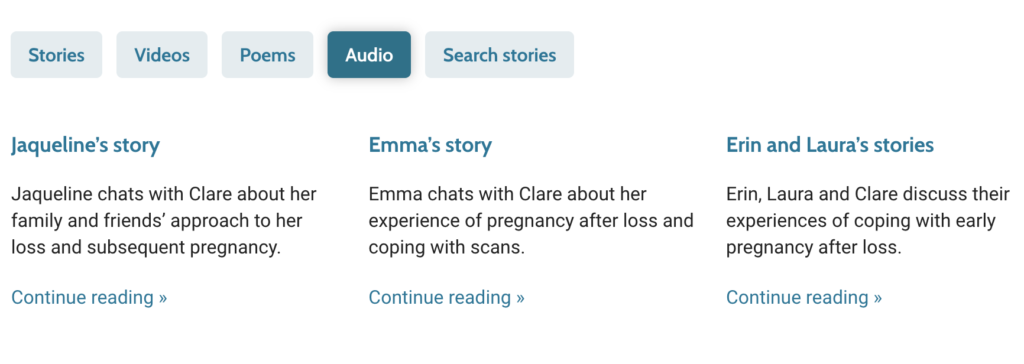I’ve recently finished editing an audio conversation with two women who have experienced pregnancy after loss. We chatted over Zoom, sharing what we found hard, how we coped and what advice we would have for someone going through something similar. I’ve done a few of these conversations recently. It’s part of a suggestion I made to the Miscarriage Association. I wanted to experiment with including audio conversations in support resources.
How does listening to conversations help?
Why do people want to listen to conversations rather than watch videos or attend online support groups? While both the latter have their place in a support package, it seems that hearing people having an informal chat about an experience you are going through reduces isolation in a way we hadn’t considered before.
I have done two pieces of research for the Miscarriage Association on the support available for people who are pregnant after a previous loss. The first was in 2017 and the second in 2022. Over this time there was a significant increase in podcasts exploring the issues. The Worst Girl Gang Ever‘s pregnancy after loss podcast is one of their most popular. Cat Strawbridge has created a Finally Pregnant podcast series. Podcasts were described as an ‘incredible source of comfort in a dark time‘, ‘like listening to friends’ and ‘like therapy‘.
There is certainly a place for support groups, written experiences and nicely edited videos. They can provide support and solace for those sharing/writing and those listening/reading. But it seems that simply listening to people chat, perhaps while you get on with something else, and without having to interact yourself can help reduce feelings of isolation while providing comfort and support.
An experiment with audio conversations
We thought it was worth including audio conversations in new support resources and seeing how people responded. So now there is an audio tab in the ‘Your stories’ section of the Miscarriage Association website and embedded audio on pages in the new pregnancy after loss hub. The conversations are warm, inclusive, honest, emotional and supportive. They are not a podcast, or podcast quality, yet. But maybe in the future it could be something to consider.


